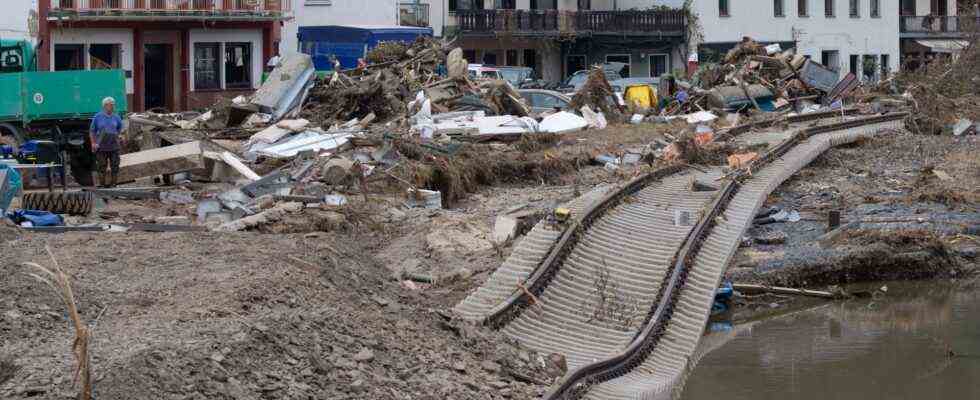Status: 07.09.2021 4:17 p.m.
The Bundestag has approved the aid fund for the areas affected by the flood disaster in North Rhine-Westphalia and Rhineland-Palatinate. A total of 30 billion euros should flow into financial aid.
Around three weeks after the decision of the Federal Cabinet, the Bundestag passed the billions in aid fund for the flood areas in Rhineland-Palatinate and North Rhine-Westphalia.
30 billion euros are to be paid out to private individuals and companies to enable reconstruction. Infrastructure measures and repairs to public buildings are also to be supported with this sum.
The federal government alone bears two billion euros for the restoration of federal infrastructure such as motorways and bridges. The remaining 28 billion will be shared equally between the federal states and the federal government. However, the countries do not have to pay in their share immediately. First of all, the federal government extends the money, the states then stutter half of their money from the federal government over a period of 30 years.
The federal government plans to invest 16 billion euros in the fund this year. The Federal Ministry of Finance does not consider a supplementary budget to be necessary because there are enough buffers.
Federal Council still has to agree
The Federal Council still has to approve the so-called “Development Aid 2021” special fund and the statutory ordinance required for it. A special meeting of the committee is planned for Friday.
It was also decided that the obligation to file for insolvency will be suspended for companies in the flood areas until 2022 in order to prevent company bankruptcies.
Start for applications not yet clarified
It has not yet been determined when the affected people in the regions affected by the flood will be able to apply for aid from the fund. First of all, the appropriate prerequisites must also be created at the state level.
The money is distributed between the federal states according to a fixed key: Rhineland-Palatinate receives 54.53 percent, North Rhine-Westphalia 43.99 percent, Bavaria 1.0 percent and Saxony 0.48 percent. As soon as the damage can be estimated more clearly, the distribution key should be adjusted.
Affected households and companies can usually receive compensation of up to 80 percent of the damage. “In addition, there are third-party benefits, for example from insurance or the immediate aid granted up to a maximum of 100 percent of the damage determined,” according to the Federal Ministry of Finance. There should be separate regulations for cases of hardship – up to 100 percent can then be compensated.
About a week ago, the Prime Minister of Rhineland-Palatinate, Malu Dreyer, announced that applications could be submitted from October. The ministry responsible for construction in North Rhine-Westphalia said that applications could possibly be submitted as early as mid-September.
Storms with unusually heavy rainfall had triggered a flood disaster in Rhineland-Palatinate and North Rhine-Westphalia. Whole areas were literally torn away or devastated by the masses of water. So far, around 190 deaths have been counted, and several people are still missing.
Chancellor Angela Merkel promised long-term support to the regions affected by the flood disaster. Reconstruction needs “staying power,” said Merkel in what will probably be the last plenary session before the general election. The people affected would not be forgotten.
Bundestag resolves aid fund for flood disaster areas
Anja Günther, ARD Berlin, September 7, 2021 3:50 p.m.

